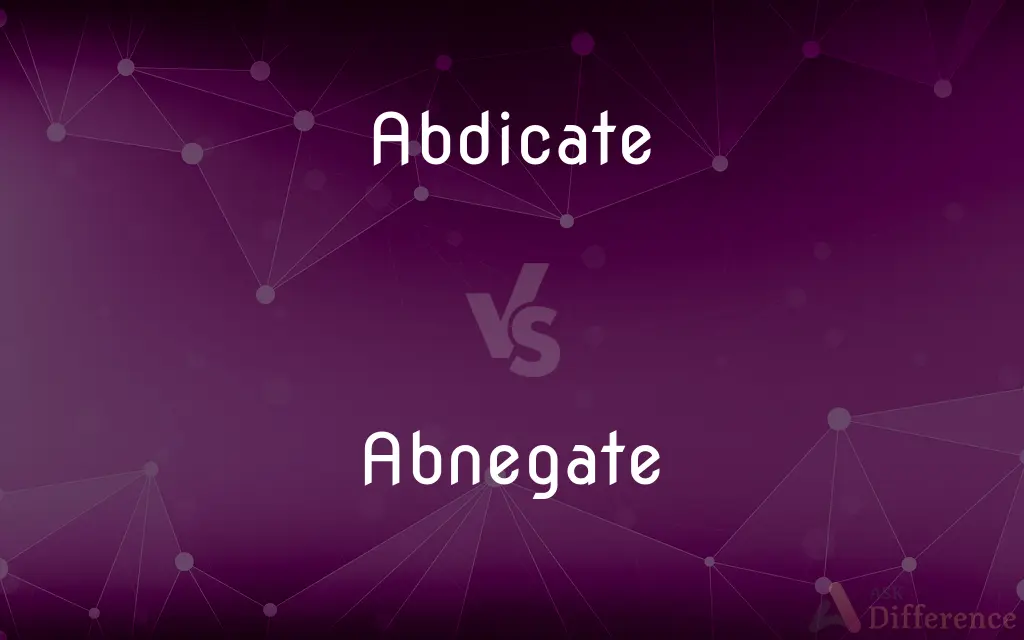Abdicate vs. Abnegate — What's the Difference?
By Urooj Arif & Maham Liaqat — Updated on April 21, 2024
Abdicate refers to formally relinquishing a high office, typically in a royal or political context; abnegate involves denying oneself things for ethical reasons.

Difference Between Abdicate and Abnegate
Table of Contents
ADVERTISEMENT
Key Differences
Abdicate primarily involves relinquishing power or responsibilities, especially in the context of a monarch stepping down from the throne. In contrast, abnegate is more about self-denial or renouncing personal privileges for moral or altruistic reasons.
While abdication often has a public and ceremonial aspect, abnegation is typically a personal, less visible act.
Abdication can lead to significant changes in leadership and governance, whereas abnegation affects personal character and ethical stature.
While abdicating is a formal act that may require legal procedures, abnegating involves personal choice and self-discipline without any formalities.
The consequences of abdication can be widespread, affecting national or organizational structures, while the effects of abnegation are usually confined to the individual's life and immediate relationships.
ADVERTISEMENT
Comparison Chart
Definition
To formally give up a position of power
To renounce or reject something desired
Context
Political, especially monarchy
Personal, ethical
Visibility
Public and ceremonial
Personal and private
Legalities
Often involves formal legal procedures
No legal implications
Impact
Affects leadership and organizational structure
Influences personal ethics and behaviors
Compare with Definitions
Abdicate
To fail to fulfill or undertake a responsibility.
He abdicated his responsibilities as a leader.
Abnegate
To renounce or reject something desired or valuable.
She abnegated the opportunity to lead the project.
Abdicate
To relinquish formally a high office.
The aging president abdicated the office yesterday.
Abnegate
To surrender or to give up a right.
He abnegated his right to inherit the family estate.
Abdicate
To renounce one's throne.
The king decided to abdicate in favor of his son.
Abnegate
To deny oneself some rights, conveniences.
He chose to abnegate luxury for a simpler life.
Abdicate
To renounce formally a sovereign position.
The queen abdicated the crown amidst political pressure.
Abnegate
To refuse or deny oneself (some rights, conveniences, etc.).
They abnegated personal gains for the community's benefit.
Abdicate
To cast off or relinquish voluntarily.
She abdicated her parental duties.
Abnegate
To relinquish out of a sense of duty.
The officer abnegated personal ambitions in favor of duty.
Abdicate
To relinquish (power or responsibility) formally.
Abnegate
To give up (rights or a claim, for example); renounce.
Abdicate
To relinquish formally a high office or responsibility.
Abnegate
To deny (something) to oneself
The minister abnegated the luxuries of life.
Abdicate
To disclaim and expel from the family, as a father his child; to disown; to disinherit.
Abnegate
(transitive) To deny (oneself something); to renounce or give up (a right, a power, a claim, a privilege, a convenience).
Abdicate
To formally separate oneself from or to divest oneself of.
Abnegate
(transitive) To relinquish; to surrender; to abjure.
Abdicate
To depose.
Abnegate
To deny and reject; to abjure.
Abdicate
To reject; to cast off; to discard.
Abnegate
Deny oneself (something); restrain, especially from indulging in some pleasure;
She denied herself wine and spirits
Abdicate
(transitive) To surrender, renounce or relinquish, as sovereign power; to withdraw definitely from filling or exercising, as a high office, station, dignity; to fail to fulfill responsibility for.
To abdicate the throne, the crown, the papacy
Note: The word abdicate was held to mean, in the case of James II, to abandon without a formal surrender.
Abnegate
Surrender;
The King abnegated his power to the ministers
Abdicate
(intransitive) To relinquish or renounce a throne, or other high office or dignity; to renounce sovereignty.
Abnegate
Deny or renounce;
They abnegated their gods
Abdicate
To surrender or relinquish, as sovereign power; to withdraw definitely from filling or exercising, as a high office, station, dignity; as, to abdicate the throne, the crown, the papacy.
The cross-bearers abdicated their service.
Abdicate
To renounce; to relinquish; - said of authority, a trust, duty, right, etc.
He abdicates all right to be his own governor.
The understanding abdicates its functions.
Abdicate
To reject; to cast off.
Abdicate
To disclaim and expel from the family, as a father his child; to disown; to disinherit.
Abdicate
To relinquish or renounce a throne, or other high office or dignity.
Though a king may abdicate for his own person, he cannot abdicate for the monarchy.
Abdicate
Give up, such as power, as of monarchs and emperors, or duties and obligations;
The King abdicated when he married a divorcee
Common Curiosities
Can abdication be reversed?
Typically, abdication is permanent and cannot be easily reversed.
Can abnegation be harmful?
If taken to extremes, abnegation can lead to neglect of one's own needs, which can be harmful.
What does it mean to abdicate a throne?
To abdicate a throne means to formally resign and give up the title and responsibilities of being a monarch.
Is abdication only applicable to royalty?
While commonly associated with royalty, abdication can apply to any position of authority.
What are common reasons for abdication?
Common reasons include old age, health issues, or political pressures.
What does abnegate imply in personal development?
Abnegate implies a voluntary decision to refuse or deny personal desires for a higher ethical or moral reason.
How does abnegation affect relationships?
It can strengthen relationships by showing commitment to higher principles, though it may also lead to conflicts if not mutually understood.
Is abnegation considered a virtue?
Yes, in many cultures and ethical systems, abnegation is considered a virtue.
How does society view abdication?
Society's view can vary, but abdication is often seen as a responsible or necessary decision under certain circumstances.
What legal processes are involved in abdication?
Legal processes can include formal declarations, legislative approval, and changes to constitutional or statutory laws.
What psychological effects can abdication have on a person?
Abdication can lead to relief from burdens but also to feelings of loss and identity crisis.
Can anyone practice abnegation?
Yes, abnegation can be practiced by anyone choosing to deny themselves certain pleasures or rights.
Share Your Discovery

Previous Comparison
Spreadsheet vs. Worksheet
Next Comparison
Iron vs. LeadAuthor Spotlight
Written by
Urooj ArifUrooj is a skilled content writer at Ask Difference, known for her exceptional ability to simplify complex topics into engaging and informative content. With a passion for research and a flair for clear, concise writing, she consistently delivers articles that resonate with our diverse audience.
Co-written by
Maham Liaqat














































